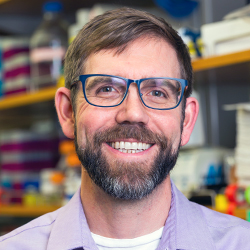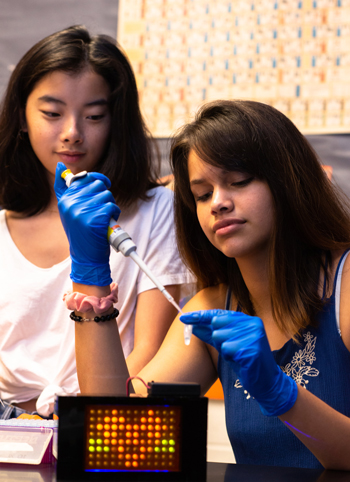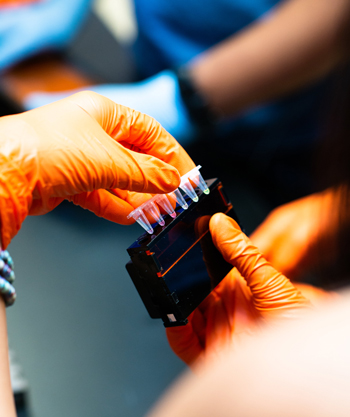New Low-cost, High-tech Biology Kits for the Next Generation of Scientists
BioBits educational kits bring synthetic and molecular biology experiments into K-12 classrooms
As biologists probe deeper into the molecular and genetic underpinnings of life, K-12 schools often struggle to provide a curriculum that reflects those advances.
Although hands-on learning proves to be more effective for teaching science to students, even the most basic molecular and synthetic biology experiments require equipment far beyond an average classroom’s budget and bacteria and other substances that can be difficult to manage outside of a controlled laboratory setting.
Now, a collaboration among Northwestern University, the Massachusetts Institute of Technology, and the Wyss Institute at Harvard University is aiming to solve this problem with BioBits, new educational biology kits that use freeze-dried cell-free (FD-CF) reactions to enable students to perform a range of simple, hands-on biological experiments. The BioBits kits introduce molecular and synthetic biology concepts without the need for specialized lab equipment, at a fraction of the cost of current standard experimental designs.
 “We wanted to create low-cost, educational kits that can be used in the classroom for less than $100,” said Michael Jewett, the Charles Deering McCormick Professor of Teaching Excellence and associate professor of chemical and biological engineering in Northwestern’s McCormick School of Engineering.
“We wanted to create low-cost, educational kits that can be used in the classroom for less than $100,” said Michael Jewett, the Charles Deering McCormick Professor of Teaching Excellence and associate professor of chemical and biological engineering in Northwestern’s McCormick School of Engineering.
The kits are described in two papers (BioBits Bright and BioBits Explorer) published today (August 1) in the journal Science Advances. Jewett, who is also the co-director of Northwestern’s Center for Synthetic Biology, and Jim Collins, the Termeer Professor of Medical Engineering & Science at MIT, served as the paper’s co-corresponding authors.
“The main motivation in developing these kits was to give students fun activities that allow them to actually see, smell and touch the outcomes of the biological reactions they’re doing at the molecular level,” said Ally Huang, a co-first author on both papers and a graduate student in Collins’ lab. “My hope is that they will inspire more kids to consider a career in STEM and, more generally, give all students a basic understanding of how biology works because they may one day have to make personal or policy decisions based on modern science.”
Synthetic and molecular biology frequently make use of the cellular machinery found in E. coli bacteria to produce a desired protein. But this system requires that the bacteria be kept alive and contained for an extended period of time and involves several complicated preparation and processing steps. The FD-CF reactions pioneered in Collins’ lab for molecular diagnostics combined with innovations in cell-free synthetic biology from Jewett’s lab bypass this issue by removing bacteria from the equation altogether.
 “You can think of it like opening the hood of a car and taking the engine out,” Jewett said. “We’ve taken the ‘engine’ that drives protein production out of a bacterial cell and given it the fuel it needs, including ribosomes and amino acids, to create proteins from DNA outside of the bacteria itself.”
“You can think of it like opening the hood of a car and taking the engine out,” Jewett said. “We’ve taken the ‘engine’ that drives protein production out of a bacterial cell and given it the fuel it needs, including ribosomes and amino acids, to create proteins from DNA outside of the bacteria itself.”
This collection of molecular machinery is then freeze-dried into pellets so that it becomes shelf-stable at room temperature. To initiate the transcription of DNA into RNA and the translation of that RNA into a protein, a student just needs to add the desired DNA and water to the freeze-dried pellets.
The researchers designed a range of molecular experiments that can be performed using this system, and coupled each of them to a signal that the students can easily detect with their senses of sight, smell or touch. The first, called BioBits Bright, contains six different freeze-dried DNA templates that each encode a protein that fluoresces a different color when illuminated with blue light.
“Challenging the students to build their own in vitro synthetic programs allows educators to start to talk about how synthetic biologists might control biology to make important products, such as medicines or chemicals,” said Jessica Stark, a National Science Foundation graduate fellow and graduate student in Jewett’s lab who is co-first author on both papers.
 An expansion of the BioBits Bright kit, called BioBits Explorer, includes experiments that engage the senses of smell and touch and allow students to investigate their environment using designer synthetic biosensors. One experiment, for example, uses a sensor that glows fluorescent when in the presence of banana or a kiwi DNA. Another experiment creates a compound that smells like bananas. The third experiment results in a squishy hydrogel, which students can touch and manipulate.
An expansion of the BioBits Bright kit, called BioBits Explorer, includes experiments that engage the senses of smell and touch and allow students to investigate their environment using designer synthetic biosensors. One experiment, for example, uses a sensor that glows fluorescent when in the presence of banana or a kiwi DNA. Another experiment creates a compound that smells like bananas. The third experiment results in a squishy hydrogel, which students can touch and manipulate.
Researchers tested their BioBits kits in the Chicago Public School system and noticed that students and teachers could perform the experiments with the same success as trained synthetic biologists. “We have been so lucky to partner and work closely with the Office of Community Education Partnerships at Northwestern, which has a deep network of collaborators and experience connecting with Chicago-area students,” Jewett said.
The team next plans to refine the kits’ design and create an open-source online database where teachers and students can share their results and ideas to modify the kits to explore different biological questions.
“Synthetic biology is going to be one of the defining technologies of the century, yet it has been challenging to teach the fundamental concepts of the field in K-12 classrooms given that such efforts often require expensive, complicated equipment,” Collins said. “We show that it is possible to use freeze-dried, cell-free extracts along with freeze-dried synthetic biology components to conduct innovative educational experiments in classrooms and other low-resource settings. The BioBits kits enable us to expose young kids, older kids and even adults to the wonders of synthetic biology.”
“As a result,” Jewett added, “the Biobits kits are poised to transform science education and society.”